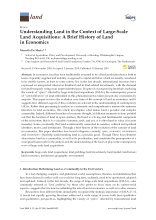Land Library Search
Through our robust search engine, you can search for any item of the over 73,000 highly curated resources in the Land Library.
If you would like to find an overview of what is possible, feel free to peruse the Search Guide.
/ library resources
Showing items 1 through 9 of 42.Umoja (noun):/ooh-moh-jah/Umoja, is the Swahili philosophy of unity. Its principles underscore the significance of cooperation and communal solidarity.
Land corruption seriously threatens efforts to fight climate change and achieve a fair energy transition. By undermining climate programmes, projects and practices, it fuels increased carbon emissions and negative climate outcomes.
This manual is intended to provide an overview of the land tenure rights to both the investment affected communities and the investors to ensure that all the different rights on land are recognized and considered.
A functioning land sector is foundational to peace and stability, sustainable development, economic growth, food security, environmental conservation and poverty reduction in the Arab region.
In economics, land has been traditionally assumed to be a fixed production factor, both in terms of quantity supplied and mobility, as opposed to capital and labor, which are usually considered to be mobile factors, at least to some extent.
Ensuring the collective survival of indigenous peoples requires guaranteeing their rights and access to traditional lands.
/*-->*/
Community land, crucial to rural livelihood around the world, is increasingly targeted by commercial interests. Its loss can lead to environmental degradation, increased rural poverty and land disputes that last for years.









